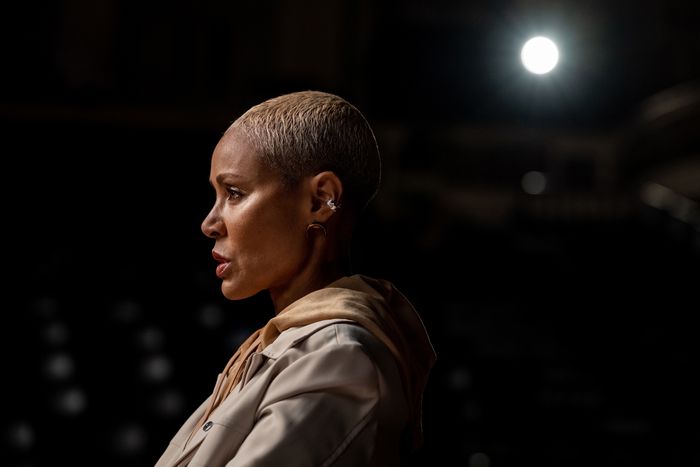
Don’t worry, Jada Pinkett Smith’s new memoir, Worthy, addresses the Slap. It addresses a number of the inconsistencies and oddities with her marriage and/or separated marriage and/or NOT divorce from her kind-of-still-husband, Will Smith. Pinkett Smith talks about her work on The Matrix sequels, her friendship with Tupac, her years leading a nü-metal band called Wicked Wisdom. She gushes about her two kids, Jaden and Willow. But before she gets to any of the classic Hollywood memoir fodder, there’s ayahuasca.
A bout of depression in the early 2010s leads Pinkett Smith to herbal medicine, and one of Jaden’s friends introduces her to “Mother Aya,” as she calls it. “She is showing me all the unloved parts of myself needing light and love within me to purify these lies,” Pinkett Smith explains. So she turns to Worthy, and to her greater audience of readers and Red Table Talk viewers, to claim her own light and love within herself, through memory and anecdote and flowery over-explanation. (Rather than call Will Smith funny, Pinkett Smith writes: “Humor was an elixir he knew how to pour.”)
In Worthy, Pinkett Smith reprises her role as Roman from Magic Mike XXL: a no-nonsense straight-talker who believes above all else that women are goddesses, they are queens, they are all-powerful, if they will themselves to be so. It is in many ways the most Virgo book of all time, and in indulging her success, she takes back her narrative — so long tied to Will — to stake her claim on her career, her work. At times, Worthy reads as little more than a résumé recap: She wants you to know all the different projects she’s done. But at the same time, it almost feels like an interactive journal: At the end of every chapter, Pinkett Smith includes “excerpts” from her journal that pose questions to the reader.
(These sections are often preempted by an inspirational quote, either from someone in Pinkett Smith’s life or an author or, on two occasions, Marvel characters. In response to the Charles Xavier quote “Just because someone stumbles and loses their way doesn’t mean they are lost forever,” Pinkett Smith adds: “That’s some real talk.”)
While the book is rich in Pinkett Smith’s family history — anecdotes about her mother, father, and various charming grandparents are wonderful — there’s little in terms of salacious celebrity gossip. Pinkett Smith’s relationship with Tupac is possibly her most meaningful connection in the book — a platonic friendship that stretched from her youth in Baltimore to her early years of fame. Though they’d almost completely fallen out toward the untimely end of his life, they challenged and loved each other through thick and thin. A few other nods toward celeb pals come up – –Pinkett Smith once skipped school to go down to NYC to hang out with her high-school pal Josh Charles (!), and she describes Tom Cruise as a “really good friend” who had “the rare ability to see through my great act of having it all together all the time.”
What will no doubt interest readers most is her discussion of her marriage with Will, which for the most part sounds like a partnership built on occasional amusement but mostly frustration: “Living on edges of our own making and driving each other absolutely crazy. Sometimes joyfully and other times with great … dislike” (the ellipses doing a lot of work for her here …). She describes their love languages: hers being “words of protection” (Slap forewarning), his being extravagant gifts and events.
What she winds up writing on the subject of their separation (or dissolution, or whatever it is) is as confusing as ever:
The solution then was to create an agreement to help build that trust by which we would never be in a position to lie to each other. In other words, a relationship of transparency, which is different from an “open” relationship. The agreement was never You can go sleep with whomever you want, whenever you want. Instead, it was Hey, when those temptations are in play, let’s trust each other to come together in partnership with the truth, talk, and work as partners through them. In this way, we eliminated any possibility of betrayal.
Pinkett Smith is eager to re-center herself, both spiritually and literally in her narrative, but she also wants to reclaim all the years she spent not in the center. Even the title of the memoir argues against itself: Was anyone ever claiming she wasn’t? Well, if the ayahuasca is to be believed (and who am I to doubt Mother Aya), the only person who had doubts was Pinkett Smith herself. She needed every failure to be spun into a type of success; she needed every tragedy to be a moment of personal reckoning. She can’t get through a Rikers visit to see Tupac without mentioning that a prison guard asked for her autograph. She’s proud to have given the country a new meaning for the term entanglement. (“You’re welcome,” she writes about her own trip to the Red Table.) Pinkett Smith ends the book hoping every reader will “find the golden threads to weave the inner kingdom that supports the making of your chosen life” –– a nice thought, maybe, from someone trapped inside an inner kingdom of their own.


